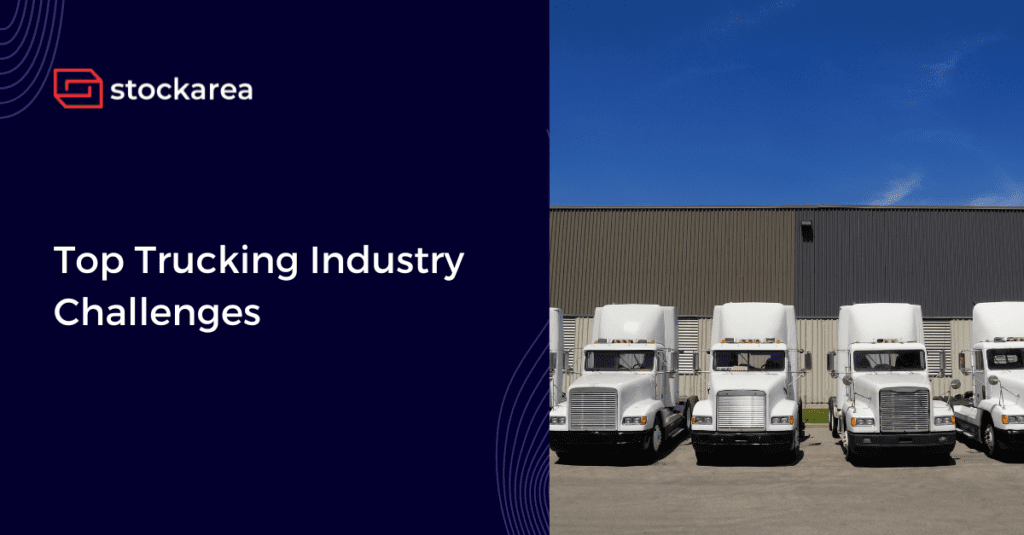The trucking industry is increasingly gaining importance as the demand for goods is rising with urbanisation, the growth of e-commerce, increasing logistics movements and rising income levels. However, the changing trucking landscape has posed various challenges to the industry. From a lack of skilled workers to increasing customer expectations, the trucking industry faces many challenges that threaten its overall efficiency and profitability. Advances in technology have the potential to address some of these challenges but often require both financial and operational investment. The trucking sector must solve the following key challenges to keep flourishing.
1. Driver Retention
The shortage of qualified truck drivers is one of the significant challenges currently facing the trucking industry. Many drivers leave the industry due to unfavourable working hours, low wages, inadequate benefits, and strenuous physical demands. The driver shortage has been exacerbated by ageing truckers and increased safety regulations, reducing the number of new drivers entering the industry and making it increasingly difficult to find truck drivers to fill available positions. Driver shortage increases operating costs and negatively impacts customer experience, as fewer drivers can lead to delivery inefficiencies.
2. Obsolete Technology
Using obsolete technology is still a significant challenge that threatens the success of the trucking industry. Outdated technology can lead to inefficiencies, as it can slow down operations and reduce the effectiveness of driver records and documentation. Systems using obsolete technology lack the data security necessary to protect customer and driver information. This could lead to issues with customer trust and a lack of confidence in the trucking company’s safety.
3. Customer Expectation
The trucking industry faces a growing difficulty in meeting customer expectations. Customers expect an improved level of services, ranging from timeliness, reliability and communication to cost-effectiveness, personalised services, and better cargo visibility. Customers also want faster delivery times, flexible solutions and more accurate information, as well as improved safety standards, real-time tracking and automated updates. Adapting to these demanding customer expectations can increase operating costs and reduce the profitability of trucking companies.
4. Rising Fuel Costs
Fuel is a major expense for trucking companies, accounting for up to 30% of their total costs. Rising fuel prices have caused an increase in operational costs, making it difficult for trucking companies to remain profitable. This affects the ability of trucking companies to compete in an increasingly competitive market and to pass on the additional cost to the customer. Furthermore, the volatility in fuel prices can make it difficult to plan ahead, reducing the efficiency of operations. The transportation sector must look out for modern e-vehicles and various fuel alternatives to overcome this challenge in the long run.
5. Environmental Impact
The trucking industry is increasingly scrutinised for its environmental impact, with emissions from truck engines being a major concern. One of the major environmental concerns surrounding the trucking industry is the amount of air pollution that is created. Trucks that are powered by diesel engines produce large amounts of gas emissions. Additionally, due to the constant and frequent idling of vehicles in trucking yards and at stops, trucks also produce large amounts of black carbon, a type of particulate matter that is hazardous to public health and can also decrease vehicle efficiency. To become more environmentally friendly, trucking companies must invest in modern, fuel-efficient and electric vehicles.
6. Profitability
The cost of operating a trucking business has been steadily on the rise over the past few years, squeezing profit margins for companies. Fuel costs, insurance premiums, vehicle maintenance and other overhead costs are all on the rise, making it difficult for trucking companies to stay financially afloat. The cost of labour is also increasing, particularly in regions with a driver shortage. All of these factors can add up, making it challenging for trucking companies to remain profitable in the current environment.
7. Increasing Competition
The trucking industry is getting increasingly competitive with the evolution of technology and many more advancements in the industry. Smaller companies are becoming more competitive by taking advantage of technology, better pricing and broader service offerings. At the same time, larger carriers are increasing their presence in the market by investing in larger fleets and introducing new services. In recent years, the trucking industry has also seen a surge in the number of new players entering the market, offering services at competitive rates. All of this has resulted in increased competition for truckers, which is driving down pricing and making it harder for truck companies to do business.
Related posts
- Top 11 Trucking Industry Trends In 2024
- 7 Latest Technologies Changing The Trucking Industry
- 10 Must-Have Transport Management System Features
- 7 Proven Methods To Improve Transport Efficiency
- Top 12 Transport Management Softwares For Logistics Companies
- Advantages & Disadvantages Of Road Transport
- 6 Steps To Start A Successful Trucking Business
- What Is Transportation Management System?
- 15 Best Courier Services Companies In India
- 10 Key Benefits Of Transportation Management System (TMS)
- 7 Steps To Choosing The Right Courier Partner
- 5 Key Benefits Of Hiring Trucking Company For Logistics
- 6 Most Important Facts Of Trucking Industry
